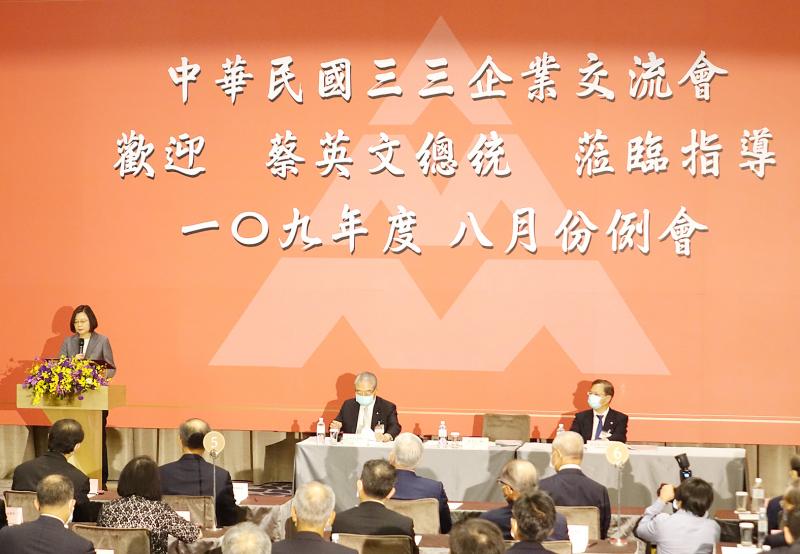Leading industrialists yesterday called on the government to keep relief and stimulus measures alive, saying that tough times lie ahead as local tech firms would be digesting rush orders toward the end of this quarter, because of remote working and telecommuting trends.
Rock Hsu (許勝雄), chairman of the Third Wednesday Club (三三會), whose membership is limited to the top 100 firms in each business sector, spoke to reporters prior to a meeting with President Tsai Ing-wen (蔡英文) in Taipei.
“The government had better prepare an extended version of relief and stimulus measures, as the industry will need it after fulfilling orders” to make chips for electronic parts used in laptops, desktops, TVs and other products, Hsu said.

Photo: Wang Yi-sung, Taipei Times
Local technology firms have benefited from a surge in demand for devices that have enabled companies and schools around the world to operate, despite travel inconveniences and social distancing, said Hsu, who is chairman of contract notebook maker Compal Electronics Inc (仁寶電腦).
Such rush orders would come to an end later this quarter, making the fourth quarter — normally the high sales season — a tough challenge, he said, adding that the global economy is still in a shambles.
Major tech firms have declined to give business guidance beyond the current quarter, citing poor order visibility.
The US’ Apple Inc has said that it would postpone new iPhone releases and China’s Huawei Technologies Co (華為) is reportedly is slowing its deployment of 5G products after a Washington ban has limited it from obtaining foreign-made chips developed or produced using US software or technology.
Manufacturers of mineral, plastic, base metal and other non-tech products would also continue to struggle due to sluggish demand, Hsu said.
Chinese National Association of Industry and Commerce (工商協進會) chairman Lin Por-fong (林伯豐) said that there is still ample room for the government to augment relief and stimulus measures, which currently stand at 6.6 percent of GDP, while packages in other countries account for more than 10 percent of GDP.
The government could do so by lowering the business tax or sparing companies the levy on retained earnings, at least temporarily, Lin said.
Far Eastern Group (遠東集團) chairman Douglas Hsu (徐旭東) said that the government could consider issuing a second batch of Triple Stimulus Vouchers to shore up domestic demand if its budget allows.
Most business tycoons painted the plans by the Ministry of Labor to raise monthly basic wages by NT$200 to NT$24,000 as unfavorable, but bearable.
The wage adjustments must still be approved by the Cabinet.

SEMICONDUCTORS: The German laser and plasma generator company will expand its local services as its specialized offerings support Taiwan’s semiconductor industries Trumpf SE + Co KG, a global leader in supplying laser technology and plasma generators used in chip production, is expanding its investments in Taiwan in an effort to deeply integrate into the global semiconductor supply chain in the pursuit of growth. The company, headquartered in Ditzingen, Germany, has invested significantly in a newly inaugurated regional technical center for plasma generators in Taoyuan, its latest expansion in Taiwan after being engaged in various industries for more than 25 years. The center, the first of its kind Trumpf built outside Germany, aims to serve customers from Taiwan, Japan, Southeast Asia and South Korea,

Gasoline and diesel prices at domestic fuel stations are to fall NT$0.2 per liter this week, down for a second consecutive week, CPC Corp, Taiwan (台灣中油) and Formosa Petrochemical Corp (台塑石化) announced yesterday. Effective today, gasoline prices at CPC and Formosa stations are to drop to NT$26.4, NT$27.9 and NT$29.9 per liter for 92, 95 and 98-octane unleaded gasoline respectively, the companies said in separate statements. The price of premium diesel is to fall to NT$24.8 per liter at CPC stations and NT$24.6 at Formosa pumps, they said. The price adjustments came even as international crude oil prices rose last week, as traders

Taiwan Semiconductor Manufacturing Co (TSMC, 台積電), which supplies advanced chips to Nvidia Corp and Apple Inc, yesterday reported NT$1.046 trillion (US$33.1 billion) in revenue for last quarter, driven by constantly strong demand for artificial intelligence (AI) chips, falling in the upper end of its forecast. Based on TSMC’s financial guidance, revenue would expand about 22 percent sequentially to the range from US$32.2 billion to US$33.4 billion during the final quarter of 2024, it told investors in October last year. Last year in total, revenue jumped 31.61 percent to NT$3.81 trillion, compared with NT$2.89 trillion generated in the year before, according to

PRECEDENTED TIMES: In news that surely does not shock, AI and tech exports drove a banner for exports last year as Taiwan’s economic growth experienced a flood tide Taiwan’s exports delivered a blockbuster finish to last year with last month’s shipments rising at the second-highest pace on record as demand for artificial intelligence (AI) hardware and advanced computing remained strong, the Ministry of Finance said yesterday. Exports surged 43.4 percent from a year earlier to US$62.48 billion last month, extending growth to 26 consecutive months. Imports climbed 14.9 percent to US$43.04 billion, the second-highest monthly level historically, resulting in a trade surplus of US$19.43 billion — more than double that of the year before. Department of Statistics Director-General Beatrice Tsai (蔡美娜) described the performance as “surprisingly outstanding,” forecasting export growth